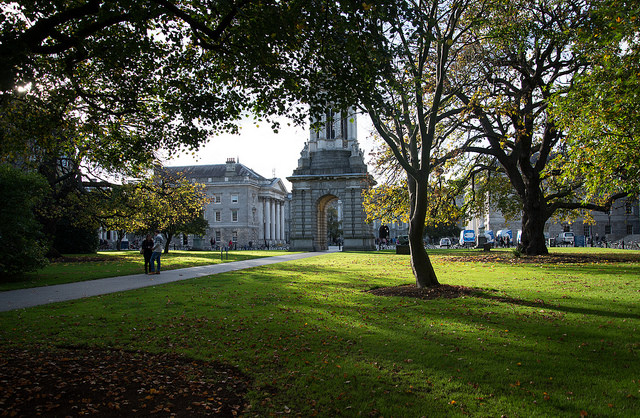Trinity has risen to 117th in the Times Higher Education World University Rankings 2017-2018, 14 places above last year’s ranking that put the college just outside the top 130.
The university was one of the few Irish colleges to rise in the rankings – a welcome boost to a college that was heralded earlier this year after becoming the latest member of the prestigious League of European Research Universities (LERU). The rise in the rankings should also dismiss, for now, concerns about being overtaken by University College Dublin (UCD) or falling outside the world’s top 200 universities.
This year’s rankings come a year after it was revealed that Trinity accidentally submitted incorrect data in 2015 resulting in a temporary exclusion from the rankings. The college was retrospectively ranked 101st place in 2015-16 – moving up 59 places from the initial ranking that year – before dropping to 131st in the most recent rankings.
In June, Trinity rose ten places in the QS rankings, a turnaround after several years of declining performance.
Rankings continue to preoccupy Irish universities and Irish politicians, with the nationwide decline in world rankings often pointed to as a symptom of several years of underinvestment in higher education. Trinity has tried, with limited success so far, to reverse this decline, setting up a rankings strategy in 2016 to try to reverse this fall that had sparked fears it might yet fall outside the top 200 in the Times Higher Education rankings.
In a press statement, Dean of Research Prof John Boland, spoke about how this year’s result was a “testament to the excellence of our teaching, research and overall educational experience”. The increase, he said, was achieved “despite so many challenging factors, including the rise of Asia-Pacific countries due to much greater investment, intense global competition, but also the continued chronic underfunding of higher education in Ireland”.
The publication of international rankings has often been paired with sharp criticism of the lack of funding for higher education. Last year, Provost Patrick Prendergast and the President of University College Dublin (UCD), Andrew Deeks, in an unprecedented statement, called on the government to “make the difficult choices that are needed to improve the funding given to universities and in the manner in which this funding is distributed”. UCD failed to return to the top 200, after falling to a ranking between 201-250 last year.
Times Higher Education rankings measure teaching, research, research influence, international diversity and industry income to determine which are the top universities in the world. Sixty per cent of the weighting falls on research and research influence, with citation number and reputation surveys largely swaying the performance of universities being adjudicated.
Trinity has had a tumultuous time with rankings over the past few years. In 2015, the College accidentally recorded their annual income as €355 instead of €355 million, causing problems with the Times Higher Education ranking for two years. Then in 2016, Boland sent out emails to try to encourage academics and graduates to fill out reputation surveys, used by QS rankings, in order to boost its reputation grading. This breach of QS rules led to sanctions for the college and exclusion from the ranking was considered.
Trinity was only Irish university to make it into the top 200 universities in the world. UCD failed to return to the top 200, after falling to a ranking between 201-250 last year. All other Irish universities kept their places from last year, with NUI Galway ranked in the 201-250 bracket, University College Cork (UCC) in the 351-400 bracket, Dublin City University in the 401-500 bracket, University of Limerick (UL) in the 501-600 bracket and Dublin Institute of Technology (DIT) ranked in the 601-800 bracket.
Boland emphasised this year that for Trinity to continue being a “world class university” it will require “resourcing at internationally competitive levels”, and reaffirmed that there needs to be “adequate investment in the university sector”.
The rise in rankings will also be significant for a university that hopes to attract staff, students and researchers in the years that follow the UK’s exit from the EU. “In a post-Brexit climate it is important that we maintain these high standards and build on this reputation for our students, for the further development of leading research, and for the overall development of the Irish economy”, Boland said.
Looking internationally, University of Oxford remained at number one for a second year in a row. Though the top five institutions in the world remains unchanged, University of Cambridge moved up to number two. The only change to the top 10 was that the University of California, Berkeley fell dramatically from joint 10th in 2017 to 18th this year, allowing the University of Pennsylvania to move up three places into the top 10.







